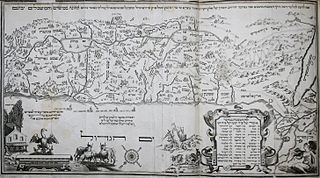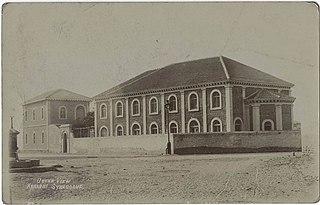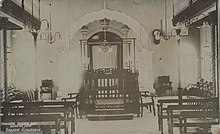
The Bene Israel, also referred to as the "Shanivar Teli" or "Native Jew" caste, are a community of Jews in India. It has been suggested that they are the descendants of one of the Ten Lost Tribes via their ancestors who had settled there centuries ago. Starting in the second half of the 18th century, after they were taught about normative Sephardi Judaism, they migrated from villages in the Konkan region where they had previously lived to nearby cities throughout British India—primarily to Mumbai where their first synagogue opened in 1796 but also to Pune, Ahmedabad, and Karachi, where they gained prominent positions within the British colonial government and the Indian Army.

Cochin Jews are the oldest group of Jews in India, with roots that are claimed to date back to the time of King Solomon. The Cochin Jews settled in the Kingdom of Cochin in South India, now part of the state of Kerala. As early as the 12th century, mention is made of the Jews in southern India by Benjamin of Tudela. They are known to have developed Judeo-Malayalam, a dialect of Malayalam language.
The history of the Jews in India dates back to antiquity. Judaism was one of the first foreign religions to arrive in the Indian subcontinent in recorded history. Desi Jews are a small religious minority who have lived in the region since ancient times. They were able to survive for centuries despite persecution and antisemitic inquisitions.

The former communities of Jewish migrants and their descendants from Baghdad and elsewhere in the Middle East are traditionally called Baghdadi Jews or Iraqi Jews. They settled primarily in the ports and along the trade routes around the Indian Ocean and the South China Sea.

The official religion of Pakistan is Islam, as enshrined by Article 2 of the Constitution, and is practised by approximately 96.47% of the country's population. The remaining 3.53% practice Hinduism, Christianity, Ahmadiyya Islam, Sikhism and other religions.

The Ten Lost Tribes were the ten of the Twelve Tribes of Israel that were said to have been exiled from the Kingdom of Israel after its conquest by the Neo-Assyrian Empire c. 722 BCE. These are the tribes of Reuben, Simeon, Dan, Naphtali, Gad, Asher, Issachar, Zebulun; and the half-tribes of Manasseh and Ephraim---all but Judah, Benjamin, and some members of the priestly Tribe of Levi, which did not have its own territory. However, since the tribe of Simeon lived well within the territory of Judah, it is not clear why this tribe was never included in this list. Also, the tribes of Asher and Reuben were never mentioned as participating in anything after the conquest, living in either Phoenician (Asher) or Moabite (Reuben) controlled territory. By the middle 9th century BCE the territory of Gad was also (re)taken by the Moabites, so the Assyrians could at most have removed the other six tribes. Thus, the "10 tribes" appears to be a misnomer, meaning all of the Israelites that were living outside the Kingdom of Judah. The Jewish historian Josephus wrote that "there are but two tribes in Asia and Europe subject to the Romans, while the ten tribes are beyond Euphrates till now, and are an immense multitude, and not to be estimated by numbers".

Since the 1990s, the Republic of India and the State of Israel have had a comprehensive economic, military, and political relationship. In 1947, India voted against the United Nations Partition Plan for Palestine, but nonetheless recognized Israeli sovereignty in 1950. Israel opened a consulate in Bombay in 1953. Collaboration gradually increased as Israel became a key Indian ally amidst the India–Pakistan conflict; Israel supplied India with armaments, ammunition, and intelligence during the Indo-Pakistani War of 1971 and the Indo-Pakistani War of 1999. Full diplomatic relations were established in 1992, when India opened an embassy in Tel Aviv and Israel opened an embassy in New Delhi. Both countries are members of the I2U2 Group, formed in October 2021, and have stated that they have a strong bilateral relationship, sharing "similarities in spirit" and facing common challenges, increasingly cooperating in the industrial and technological sectors.

There are many synagogues in India, although many no longer function as such and today vary in their levels of preservation. These buildings dating from the mid-sixteenth through the mid-20th century once served the country's three distinct Jewish groups—the ancient Cochin Jews, and Bene Israel communities as well as the more recent Baghdadi Jews.

The Magain Shalome Synagogue was a synagogue in Karachi, Pakistan. It was built by Solomon David Umerdekar in 1893, when the region was still under British rule as India. The synagogue was destroyed in 1988 by the orders of then President of Pakistan, Muhammad Zia-ul-Haq, following which a shopping plaza was built in its place.
The Bani Israel Graveyard is the only Jewish cemetery in Karachi, Sindh, Pakistan. This cemetery is a part of the larger Mewa Shah Graveyard. Over the years, the area has been reduced. The graveyard currently holds about 5,000 graves.
Esther David is an Indian Jewish author, an artist and a sculptor. She is a recipient of the Sahitya Akademi Award.

Indian Jews in Israel are immigrants and descendants of the immigrants of the Indian Jewish communities, who now reside within the State of Israel. Indian Jews who live in Israel include thousands of Cochin Jews and Paradesi Jews of Kerala; thousands of Baghdadi Jews from Mumbai and Kolkata; tens of thousands from the Bene Israel of Maharashtra and other parts of British India and the Bnei Menashe of Manipur and Mizoram.

The history of the Jews in Mumbai, India, began when Jews started settling in Bombay during the first century, due to its economic opportunities. The Jewish community of Bombay consisted of the remnants of three distinct communities: the Bene Israeli Jews of Konkan, the Baghdadi Jews of Iraq, and the Cochin Jews of Malabar.
Pakistani Jews in Israel are immigrants and descendants of the immigrants of the Pakistani Jewish communities, who now reside within the state of Israel. They number between 1,000 and 2,000. The majority of these refugee Jews are those who migrated from Karachi, Sindh, Pakistan to India and then many to Israel as part of the Jewish exodus from Arab and Muslim countries, and formed a small community in the city of Ramla. The Jews in Pakistan were mainly Sindhi Urdu Marathi-speaking Bene Israel.
Antisemitism in Pakistan is the presence of hostility and discrimination against Jews in Pakistan based on prejudices against the Jewish people and/or the religion of Judaism. Alongside the prevalence of general stereotypes, Jews are commonly subjected to negative views, feelings and rhetoric in Pakistan, most of which overlap with and are directly related to the antisemitic views prevalent throughout the Islamic world. Widely regarded as miserly within Pakistani Muslim circles, Jews residing in Pakistan have also faced periodic intolerance by the state, which has intensified since the Islamization period of the 1980s under Muhammad Zia-ul-Haq, who propelled Pakistan towards the adoption of strict and highly-conservative Islamic practices and laws. The Jewish population of Pakistan has rapidly decreased since the state's founding and separation from neighbouring India in August 1947, and as of 2019 estimates, stands at less than 200 people amidst Pakistan's total population of over 200 million, the majority of whom are Muslims.

The history of the Jews in Kolkata, formerly known as Calcutta, in India, began in the late eighteenth century when adventurous Baghdadi Jewish merchants originally from Aleppo and Baghdad chose to establish themselves permanently in the emerging capital of the British Raj. The community they founded became the hub of the Judeo-Arabic-speaking Baghdadi Jewish trading diaspora in Asia.
Shalva Weil is a senior researcher at The Seymour Fox School of Education at the Hebrew University of Jerusalem, Israel. In 2017, she was GIAN Distinguished Professor at Jawaharlal Nehru University, in New Delhi. She has researched Indian Jews, Ethiopian Jews, and the Ten Lost Tribes and specializes in femicide, qualitative methods, violence, ethnicity, education, religion, and migration.

Jews started settling in Bombay in the 2nd century. The Jewish community of Bombay consisted of three distant groups, the Bene Israeli Jews, the Baghdadi Jews, and the Cochin Jews.

The history of the Jews in Bangladesh refers to the history of a tiny Jewish community in Bangladesh, previously known as East Pakistan. Jewish history in the country can be traced to the 18th and 19th centuries. The Jews of British India and Pakistan had a small community in what is now Bangladesh, particularly in the city of Dhaka. Jewish residents were also reported in Rajshahi. The Jews of Bangladesh are reported to have been Baghdadi Jews and the Bene Israel. Most of these Jews emigrated by the 1960s. Now, only a few Jewish families live in Bangladesh very quietly due to government policy towards Israel.















